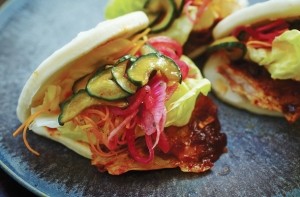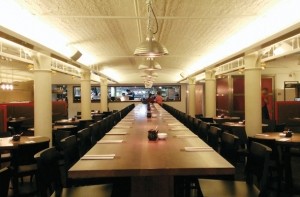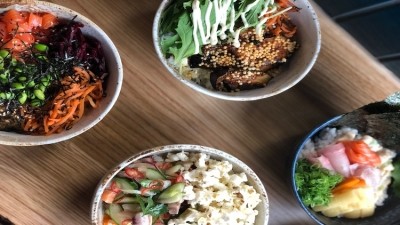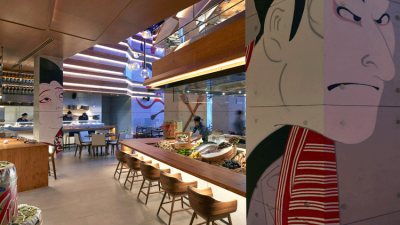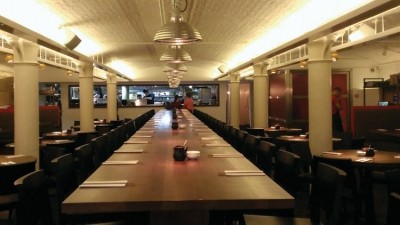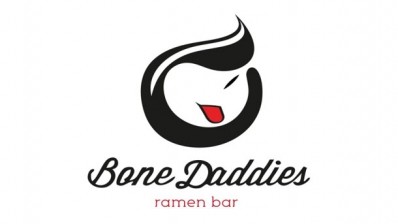Business Profile: Bone Daddies
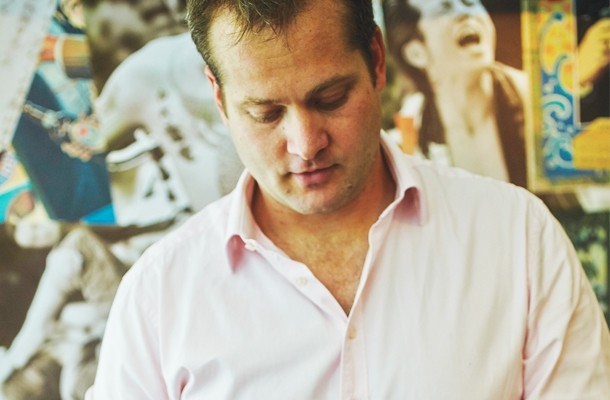
Ross Shonhan is a noodle geek. He is also a 6ft 4in former rugby-playing Aussie, so you might not want to tell him to his face.
He is passionate about “all the things a bowl of noodles can be” and very pleased that his Soho ramen bar, Bone Daddies, is the only venue in London to be represented at the Shinyokohama Raumen Museum in Tokyo, dedicated to ramen noodles (yes, such a place actually exists). Yet he is also very happy if customers come into the restaurant and don’t even recognise that the spirit of the place is Japanese.
“I am not trying to force it down people’s throats. You have got to be very careful if you are trying to recreate a traditional food, especially if you are not from that part of the world, that you don’t make it too contrived,” he explains.
“I just wanted people to experience the great ramen that I had in Japan and to give it a London vibe.”
Shonhan’s love affair with Japanese food began when he landed the head chef job at Nobu Dallas 10 years ago and his subsequent travels to the US honed his desire to bring real ramen, not the heavily processed version experienced by most visitors at Japanese transport interchanges, to London. Plus the style of cooking really appealed to him after his more formal cheffing career.
“Ramen chefs are like the punk chefs of Japanese cuisine – there aren’t really any rules,” he says.
For Shonhan, the drive behind Bone Daddies is 100 per cent the food – “I didn’t work as a chef for 20 years to serve shit,” – which is why criticism sometimes levied at Bone Daddies, usually from customers of Far Eastern origin, that the food is not served authentically boiling hot is especially irksome.
Critics say he’s toned it down to suit the British palate but it’s more down to space restrictions than a deliberate cooking choice, he says. The kitchen is in the basement, making it practically impossible to serve noodles at the ideal temperature.
Despite these occasional criticisms, the first Bone Daddies has been a commercial success thanks to the food and also the loud rock ’n’ roll music it plays and the rough and ready decor that has marked it out as a cool hangout for young foodies. Shonhan spent only £120,000 on the fit out of the 60-cover restaurant, which opened on Peter Street in 2012 and which now consistently serves 2,700 customers a week (although this dips in the warmer months).
A three-pronged approach
Despite his slight obsession with ramen, Shonhan had originally intended to make his debut restaurant a high-end Japanese steakhouse – 100 covers, £80 to £100 spend per head. It makes sense given his experience at both Nobu and, later, Zuma in London.
What he hadn’t quite factored in was the difficulty in finding and securing a site, let alone one large enough for such a concept and in a suitably prestigious location.
After leaving Zuma, Shonhan had formulated three business plans: one for a ramen bar, one for a steakhouse and one for an izakaya – a Japanese pub that often serves a wide range of traditional Japanese dishes from sushi to yakitori skewers. The site reality check led him to focus first on the noodles – something he is now grateful for because it found him at the vanguard of a ramen revolution in the capital.
The success of the first Bone Daddies has also made finding subsequent sites a lot easier. At the start, agents weren’t exactly helpful so his property searches involved walking the streets and knocking on doors. He endured six months of rejection from the owner of the Malaysian restaurant that previously occupied the Peter Street site before she even agreed to have a conversation with him.
He now operates two Bone Daddies, the second opening above Whole Foods Market in Kensington in 2014, while his experimental pop-up restaurant, Shackfuyu, also in Soho, which melds Japanese flavours with global culinary styles – fried potatoes with Japanese curry sauce, prawn toast ‘masquerading as okonomiyaki’ – is likely to become a Bone Daddies sometime next year.
Yet it is with the third Bone Daddies, soon to open on London’s old Street, that he believes the combination of the one-level property, the lessons learned from the other sites (eg, the popularity of takeaway at Kensington), and having a bit more money to spend on fit out, will allow his ramen bar to fulfil its potential as a concept that has legs. “I am never going to be that guy who rolls out 100 restaurants around the UK; that doesn’t excite me,” he says. “But I think we could do 10 in London and still maintain the quality.”
The izakaya concept never quite materialised and is unlikely to now, Shonhan admits. He had originally planned to put it into the subterranean Covent Garden site he bought not long after opening the first Bone Daddies, but the space lent itself to a food-focused operation – in this case, principally meat-filled hirata buns. Thus Flesh & Buns was born.
At the time, hirata buns were almost unheard of in the capital outside a few specialist places, but now Shonhan says “every man and his dog does beer and buns”.
During the week, the restaurant serves about 200 covers, going up to 450 on a Saturday, with an average spend of £32 per head (at Bone Daddies it’s £17). The kitchen skills required for the concept are complex, hence Shonhan doesn’t feel it has the scalability of Bone Daddies. However, he says he would be keen to do a ready-filled bun takeaway version in Soho, especially now awareness of them is higher thanks to him and also the likes of Taiwanese operator Bao, which opened its first permanent site in Soho earlier this year.
Banking on a strong future
Shonhan has a number of silent business partners and, impressively, also has the backing of Bernard Kantor, the managing director of Investec Bank. “I got screwed very early on by a backer and it was a vast learning experience,” he says. “once I had secured a site, I went pitching to a couple of different people I had met over the years and, ultimately, Bernard gave me the best gut feeling.”
His instincts didn’t let him down. Despite his hugely responsible job, Kantor is always there to talk to him and is incredibly enthusiastic about Shonhan’s ventures – he had been a customer at Zuma, although the two didn’t meet at that time. “I had heard horror stories of investors who think they own the place and come in expecting free food and drink and to dictate what goes on the menu. I wanted to get a partner who would let me fly and I’ve been very lucky.”
Kantor is very keen on the steakhouse idea and Shonhan reckons, realistically, it will be one and a half to two years before it is up and running. The latter’s dream is to make it a signature restaurant that he can take to key locations around the world – and he can’t wait to get back to doing what he loves best... cooking. “If I achieve even half the success of either Nobu or Zuma, I will be extremely happy,” he says.
Shonhan certainly has the ingredients to make this happen. Not only does he have the backing and now the experience as a restaurant operator, he has an inherent determination never to give up.
Injury curtailed his original ambition to become a professional rugby player so he briefly studied nursing with a view to becoming a physio. He didn’t like it and thought cheffing may suit, having enjoyed home economics at school and working in a butcher’s shop in his teens. So, he did a four-year apprenticeship in Australia before moving to London, working at Asia de Cuba and then The Dorchester before heading to the US to work with Texan chef Stephen Pyles.
When he jumped in at the deep end, taking the head chef job at Nobu Dallas, it was a wake-up call about the tough demands of the industry. “I was 26 and I was well in the shit, with Nobu himself [metaphorically] kicking the shit out of me,” he recalls. “But it was career changing.”
His way through it was working 21-hour days – growing up on a cattle farm in the Australian outback and the rugby training had given him the stamina to stick it out, even though all the original sous chefs quit.
It is not a style of management he would ever employ himself, even though he looks back at that time as “amazing”. He wonders aloud if he is a bit soft on his own staff but almost in the same breath talks about how, one day, he’d like to bring more disadvantaged youngsters into the industry, particularly at Bone Daddies.
For now, however, Shonhan’s focus is on getting old Street up and running and continuing to build his Japanese empire. Having so far used his noodle to great effect, it’s worth keeping an eye on
